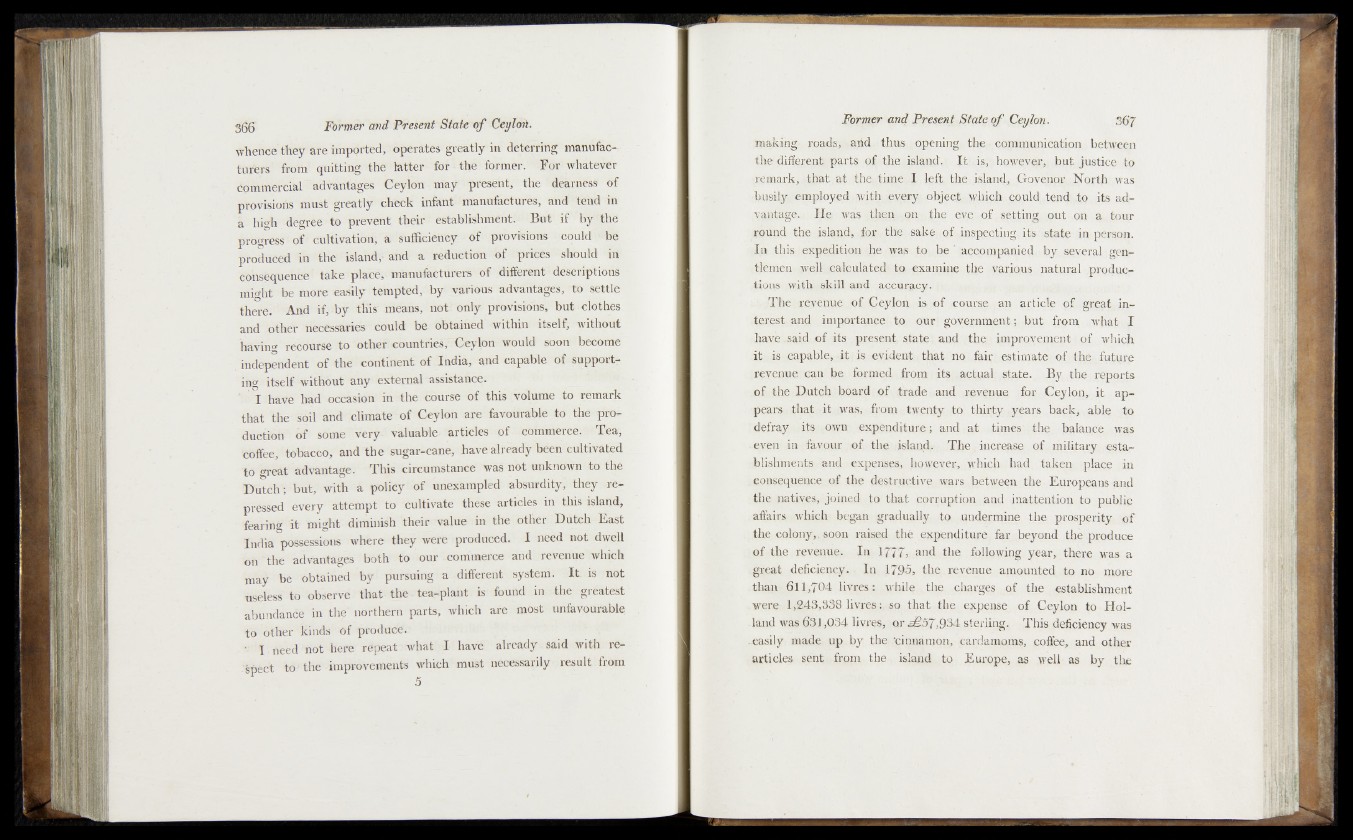
whence’ theyâre ïrapotlfedp^erâtês' gFeâtly in deterring m a a u f c
qüitting tt e hitter for ; th efo rm e r/
commercial advantages Ceylon may present, ' the dearness M
provisions must'greatly check in&nf manufiictü¥es, and !Wnd in
a h'igfe^'-^r'èr'^-prevent tbek^ êrtafeliîdixiîént. B u tb il by'«the
jWbgrfesS'- of cultivation, a sufficiency of provisions V&®uld i!Jbe
produced ^ - fH ê '; island,> and a ;re0uetiOn of ptîiês: shbutd’jin
cdnsfeqtiehôbl take place, ufânufactürers of different-descriptions -
might ‘fee ftiore easily tempted, by* various advantages, 'to settle
there. And if,^by this" means, notronly provisions, but-clothes
and i p necessaries could be Obtained within:-itself, without
W in g recourse to other countries, Ceykm would: soon ■: become
independent of fh éî continent of India, and capable of « p d r i *
ihg : ifceif%ilfiout any external assistance.
I have bad occasion in the course of this volume to remark
that the-«Oil and- climate of Ceykm are favourable to the pro,-
duCtSôh - Of- some very valuable articles Offl commerce,:: Tea,
coffee, tobacco, and th e sugar-cane, have already been cultivated
’É» ^-eæd; âdrimtâge. This circumstance *ras not unknown -te. thè
Ünteh ; bût, with â f R À l é y unexampled absurdity/ they ^expressed
everÿ attempt to •'cultivate these articles in this island,
fearing -it might diminish their value in the other Diitch -East
India possessions where they were -produced. I neéd not dwett
"the advantages both to our ..commerce and revenue which
may hé obtained ‘ by pursuing a different system. I t is-çnot
useless to observe that th e . tea-plant is- found in ubW gréatest
abundance in the' northern parts, which are most unfavourable
#R è tfe r kinds Of produce.
‘ I feed-not here rëpeatxwhaf. I ; have alreadysaid with re-
-è^éët %(ÿ* thù improvements which must necessarily , result from
5
making roafls,^^df.rihuS;Èqipening.J']lhe/jeomLmunication between
tlie: di%jr{e^t| parts o&^q.d^lqfsd--' I-t hnwg^grift bp): ,justigf$fp
^magk,* that at,;tiisLtj^p^.J lflftJ ifjhe-ftifdand.., (rnyAqr. Nnrfp was
;hpsilypempl°yed, with^yÿfjgl, ^>bjpe^ which gffliJdfJtend< fo its adr
\ag$ag% was thqi ^ m ^ j|he .spfefeipg, pot on a tour
roünd^ftfie i s l a n d , - s t a t e iniperspn.
In> this expedition he was t p ^ g ‘tJaga^paHie^j hy.,Sgv,eral :gerç-
(tlemen^efij^aJeUfl^te^tPi pxaBaiiiq the ..j^ri^up natural produo-
with-skill and agepigpy. h
:.^-/The';)r^ve^^jofi^qy|{>iii .'is(i;of course ;ap, agtigle ©f great iq~
4M§sfe and impqrt%ncef,to qurf government ;; bnt fcqna ,,what, I
haye«sai-çhof its ,present, state! and /th e; improvementspjh .which
it- iis^igjapabtexiit is. evident thathq;,faiy,q£timate^<^ jffiÉj .future
Ireyenpeican be. formed,^.from -its^actual , state. By the^gepprts
.of the Dutch:hoard of trade and (l'gveppq for. Ceylon, it ap^-
p dars|4h#^it was, from twenty >jfp thksfcy «years baçk, able to
defray si‘tfj.;own expenditure ; and ■ at times the balance was
even in vfa^UW ;th& island.. T h e , incre^g ^ ^ în ilif a ^ îe s ta r
expense^ however,;yhiçh had taken place in
consequence-of the destru^iVf[;wars.^Jfjetween the Europeans and
the. natives, joined, - to that corruption, and inattention to public
affairs which began gradually; to undermine the prosperity pf
the colony,, .soon raised th e .fffg^nditu^e far beyond the produce
©f the revenue. In 1777, and the fqllqwing year, there was a
great deficiency. , Ip ; 1795» the.revenue amounted to no mom
than 611,704 livres ; while ,the charge^ of the ; establishment
were 1*243,338 livres so that .the expense of Ceylon to Holland
was 631,034 livres, qr .§§,57,934 sterling. This deficieney was
-easily made up by. thex’cinuamon, cardamoms, coffee, and other
articles- sent from the 1 island to Europe, as well as by the